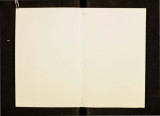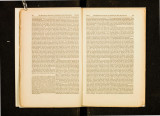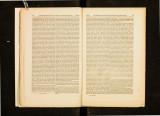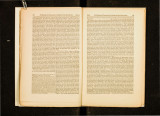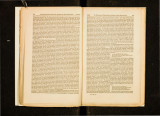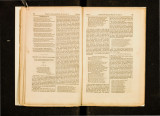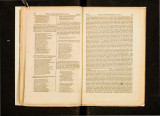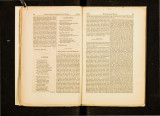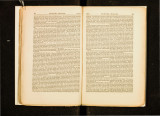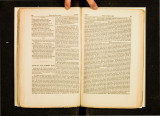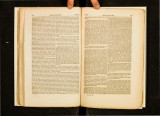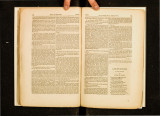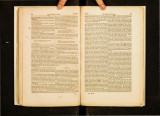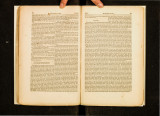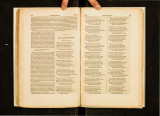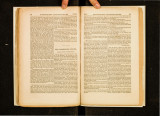| OCR Text |
Show 506 Oregon 1'errito,·y-Rush's Residellce at L o11d011. (AUGUST, . . . \" ncs ourselves of the right of traffic with the na.tives ah~vc lows, I was able to pomtlus a~lenuon to t'he 1_nto that arallel. This was the general ~~planatton 00 the map which tr~ced ~or_ tttl~. H_e '' ent 1 •111 I av: of the little memorandum in wn_twg. I had no remarks, beyond stmply m_ttmattng th.tt our cl~~i- Je7-t wi~h 1\lr. Canning; which, brief as tt was, had seemed mucl~ beyond any thmg England ha_d ant ble been carefully formed from my instructions. l\'ly pated. ~ satd that 1 h~d the hope of belllg_ :ion note concluded with saying, that I was charged hy to show tts good foundattnn _when the ncgot tat ure Go,·ernment with other views of the whole came on, Further _conversatiOn of~ grren:,~al n~ Jef~ ::~·ect, which, when the negotiation came on, I passed on the suhjeCt, and on comtn ... a ay, 1 1 tid be satisfactorily demonstrated. with him, at his request, a brief, it_tform_a~ state- had tlte lOpe _wm h' 18th) I received a second mentor memorandum of our claim, tn wnttng. ·• Under thts date, (t e : •riuen from his "Vespasian when too ill to sit up and auend to famil iar note from Mr. Cannwg, \~d k . business oave audicnC'C to AmUassad•Jrs in bed. bed, in which he says that he wou ~a ·e1 my ex~ Lord cha~ham when confined to _his ?ed with the phlll~tion 'like the wise and war~sid;~:~~~~~~ .• ~' gout, received and did business _with hts. collea~nes old times, adrefer~r.dum and ad_ co iew with ~J r. of the administration. Jl e re, 111 ad1.ht1on, a For- "January 2, 182<1. H ad an !0\e~v . eign Secretary of England in bed with the go~lt, Canning at Gloucester Lodg_e, at, h1~ requ~·st. llts receives and transacts business with a Foreign Mm- allack of gout had passed o~. 1 he ltlte1rvtcw ~vas ister." mainly to confer on the subJeCt of the Nn~th \\ .est u December 18. Yesterday. before night came Coast. H e objected strongly to our chum gowg on, 1\Ir. Canning's servant brought m_e a private as high north as fifly-on_e, and hoped we would n~t note. It was familiarly written, telhng me that urge it. He said, that tt \~'as to th~ so~lh_ of this he remained as when I saw him; but that when I line that Britain had her dispute With Spa ill about had left him, he naturally looked_ at my memora1n- Nootka. . Sou 1~d. H ow, th~refur~, cou11d ;~l~v~l:\: dum, and, when he did look at 1t, how could .1e yield thts pOint to the Umted States_· He ltelp exclaiming, 'What is here!' 'Do I read question too important for her_ t?, gtve up. 1\l r. Rush aril!.hl1' again hoped we wuuld not urge tt. •· • The United States will agr~e to ·~a~e "~::;: The official negotiation was opened on t~1e 23rd tlement north of fifty-one, on Gt_eat ,Bntalfl ao of J anuary, 1824_ l\lr. Canning was asststed by ing to make none south of th~t ltne. . . Mr Huskisson. Mr. Rush, with no Jess modesty •· 'So far all is clear,' conunues _J\'lr. Canmng Ill tha~ wisdom, asked for a. colleagnc, but none being his note. • The Jll•inl of cont~ct ~~ touched. and pointed he entered the diplomatic field alone. consequently the point of possJ~le_dtspute between ap'fhere bein{J man,· ot her subjects of disc ussion, the United States a nd Great Brttam; but the mem- the Oregon ~uesti~n was not reached until the orandum goes on, eleventh conference between the negotiators. In • Or north of fifty-five!' a report made by Mr. Rush to his Govcrn~ent and ", \Vhat can this intend.' continues his note. inserted in the work before us, ~r~ contatned the , Our no;them question is with Hussia, as our substa nce and result of the negot1atton. At P· 504, southern with the United States. But do the Uni· he says, . . . ted States mean to tra,•el 11orth to get between us "I r eminded the British Plempotentmne~, that, d Russia 1 and do they mean to stipulate against by the third article of the treaty of Washmgton, ~n eat Britain in favor of Russia, or reserve to of F ebruary the twenty-second, ISH), ~etween the th~mselves wbate\'er Russia may not want 1' United States and Spain, th~ boundary line between "The note ends with saying, that he had given the two countries was fixed, to _part, along_the ~~:~t;~ me only his first thoughts, and hoped I would ' help ern bank of the Arkansas, to Its source, m Ia. him to clear the perplexity of them.' 42 north, and thence by that_ parallel of latitude, •• 1 aimed at this by answering his note, instanter. 1.0 the south sea ; and that Spaw had als~ reno~1n~:~ ) said that it was even so; our propru;al was, that to the United States, by the same arttele, a Great Britain should forbear fu rther seu\ements rights north of that parallel. I then made kn~wn, soulh of 5 1, and tWrlh of 55, for we supposeJ that at this and Olher conferen1·es, for, from th~ e~~e:~ she had in fact no seulements abo,·e 55; and we of the subject, 1 was unable even to open It a snppo~ed 55 to be also the southern limit of Russia, one confe rence, what 1 understood to be the natur~ it be ing the boundary wtthin which the Empernr of the title of the United States to the whole .o Paul g ranted certain commercial privileges to his the country north of the parallel stated._ I satd, Russian American Company in '99. Fifty-one was t.h:t.t, apart from all the right as thus a~qutred from taken my answer went on to say, as the northern S pain, which, however, was regarded oy my Gov· limit ~f the United States, because necessary to ernment as surpa~sing the right of all ~ther Eurogive us all the waters of the Columbia; and it added, pean Powe rs, on that coast, the U nn_ed States that we had no design to concede to Russia any olaimed, in their own r ight, and as theu absolu;c sy11em of colonial exclusion above 55, or depri,·e and excluti\·e &O\'ereignty and dominion, the who 8 1845.] Oregon Ten-ilory-RusA's Residc11ce at Lo11don. 607 of the count.ry west of the Rocky Mountains, from At p. 5DS, he thus states the reply of the Bri-t he 42d to at lea!'t as far up as the 5 l st degree of tish Plenipote11tiaries. n~)r\h latJtud~, Thisci<Lim they rested upon their first dt~co:cry of the river Columbia. followed up by an "She [Great Dritain] had not, hy her conv_cneflecttve settlement at its rnomh, a senlement which tion with Spain in 1 i\JO, or at any o~her pertod, was reduced by the arms of Britain Juring the late conceded to that power any exclusive nghts on that \~·ar, bm formally surremleretl np to the United coast, where actual settlemen_ls ~ad notlte~n forme~ . S_tates at the return of peace. T heir right by first She considered the same prtnc1ples applicable to ~t dtscovery, they deemed peculiarly strong, ha\·iug now as then. She could not concede t(_) the Um· been made not only t'romthe sea by Captain Gray, ted States. who held the =::ijmnish titlc,clauns whJCh bnt also fr~Hn the interior by Lewis and Ch rke, she had felt herself obliged lt~ resist, when. advanwho fi~st dtscovered its sources, and explored its ced hy Spain, and on her reststance to winch tho whole tnland course to the Pacific Ocean. It had credit of Great Britain had been thought to dcheen _ascertaine1l, that the Columbia extended, by pend. the nver l\lultnomah, to as low as 42 north ; and "Nor could Great Dritain at all admit, the PlenUy Clarke's river, _to a point as _high ~tp as .'"il, if ipotentiaries said, the claim of t_he United States, not beyond tltat potnt, and to this enure range of as founded on their own first dJscovery. 1t had cou_ntry, conuguuus to the orig-inal dominion of the been objectionable with her in the negotiation of ymted_ St~tcs, and made a part of it by the almost IS IS, and had nnt been admitted since. H er surJllter. mmgltng waters of each, the United S tates. render to the United Stales of the post at Col om· I satd_, c_onsidered their title as establi~hed by all bia Riv er after tllC late war, was in fulfilment of the ynnc1ples which had ~\·er been applted on th_is the provisions of the first a rt icle of t~JC T reat_y of subJect b~ the po\~ers of Europe, to sett lement~ tn Ghent, without affecting quest ions of rt~h.t on euher t l.tc Ame n can hemtsphere. I asserted, that a natton, side. Britain did not admit the valtdity of the dt~co~erinl? a count ry, by entering the mouth of its discovery by Captain Gr:ty. He had unly been prtnctpal nver at _the sPa coast, must necessarily on an eutcrprisc of his own, as an indivi~ual, and b~ allu~''ed _to cla tm, and hold, as gre~1t an extent the British Go\·ernment was yet to be tn for~ned of the tnterwr cot~nt~y, as . was desc~thed .Uy the under what principles or usage, among th_c natwns course of such J>nnctpal nver, and Its tnhutary of' Europe, his havin~ first entered or drsco\'ered streams, and that the c laim, to this e xtent, became the mouth of the river Columbia, admittin!! this to doubly strong, where. as in the present instance, have Ueen the fact, was to carry after it such a the same ri''_t'r had a lso be~n rlis~overed and ex- portion of the interior country a.s was alle,:;-~d. plored from Its very mountain spnngs to the sea. Great Britain entered her dissent to such a. cl:um, Such a. union of titles, imparting validity to each and least of all, did she admit that the circuml• ther, did nnt often exisL I remarked, that it was sta1:ce of a merchant vessel of the United States, scarcely to be presur~1ed, that any ~~uropea~t nation ha,·ing penetrated the coast of that continent _at would henceforth proJect any colontal estaOIJshment Columbia river, was to be taken to extend a clatm on any part of the North \Vest Coast of America, in f.'l\'Or of the United States along the same coast, which, as yet, had never been nsed to a.ny other both abo\'c and below that river, over latitudes that useful purpose, than that uf trading with the abo - had been previously discovered and explored by rig-ina\ in habitauts, or fishing in the neighboring Great Britain hcrsf'lf, in e xpedit ions fitted out under seas; but that the United States should contemplate, the authority and with the re-sources of the nation. and at one day form. permanent establishments the re, This had been done by Captain Cook, to speak of was natu rally to he expe~ted, as prox i~~te 10 tl.tcir no others, whose \'Oyage was at least prior to that own posscsswos, and fallmg under thctr tmmedtate of Captain Gray. On the coast, only:~. few dejurisdiction. Speaking of ~he powers of Et!rn~e grees south of the Columbia. Britain had made who had ever advanced clatms to any part ot tins purc hases of territory from the natives, hefure the coast, I referred to the principles which had been United S tates were an independent power, and settled by the Nootb Sound Com·ention of l i90, upon that river itself, or upon rivers which flowed and remarkf'd, tltat Spain ltad now lost all her e x- into it west of the Hncky Mountains, her subjects elusive colonial rights which were recognized under had formed settlements coeval with, if not prior to, that coltven tion, first, by the fact of the Indepen- the settlement by American citizens at its month." dence of the South American states, and of Mexico, "Hesuminrrthesuhjcct, I said, that it \l":tS unknown and next, by her express renunciation of all her to my Gover~ment, that G reat Britain h:td ever rights, of whatever kind,_ above the 42d degrt:e of e '·en advanced any claim to territory on the North north latitude, to the Umted States. T hose_ new \Vest C:oast of America, by right of occupation, slates would, themselves, now possess the ng-hts before the Nootka Sound contnl\'ersy. lt was incidentto theirl:ondit ionofpoliticalindvpendence, cle~tr, that, by the treaty of Paris, of liG3, her and the claims of the United States above the 42_fl territorial rights in America were lmnnded westparallel, as high up as 00, claims as well in the tr ward by the Mississippi. The claim of the United own rigltt, as by their succession to the title of States, under the discovery by Captain Gray, was, Spain, would he uceforth necessarily preclude other therefore, at all events, suffi..:icnt to overreach, in nations from forming colonial establishments upon pmnt of time, any that Great Britain could allege any part of the American continents. 1 was there- along that coast, on the ground of prior occupation fore instructed to say. that my Government no and settlement. • • • Vancouver himself, onlonger considered any part of those continents as doubtedly the first British navigator who had ever open to future colonization by any of the powers e ntered it, [the Columbia,] admitt ed that he found of Europe, and that this was a principle upon Captain Gray there. • • • The ship of Captain which I should insisl. in the course of the negotia- G ray, whetlwr fitted out by the Guvernment of the tion." United States, or not, was a national ship. 1f she |


